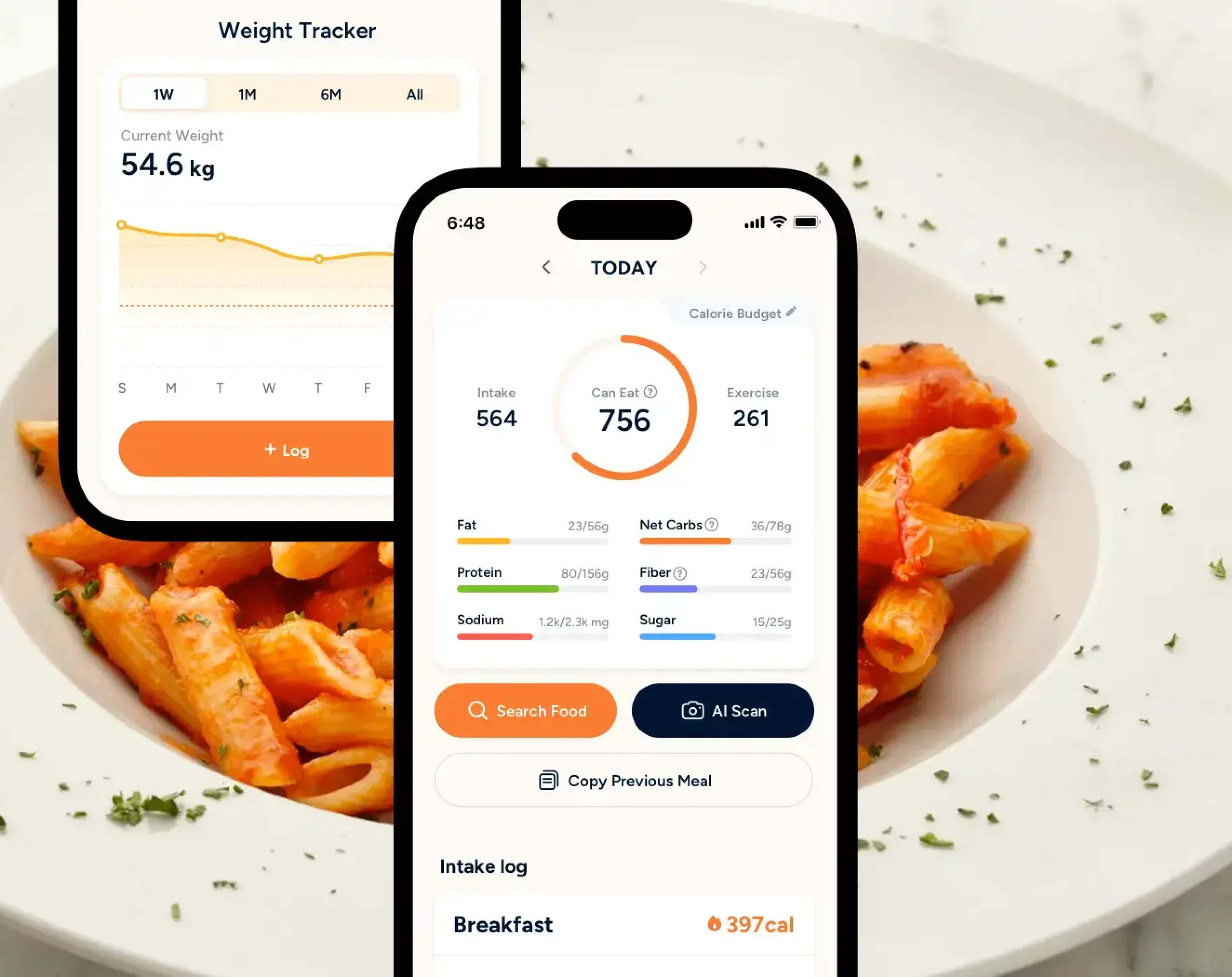We’ve all probably experienced a tough day once in our lives. Be it a stressful deadline, dealing with a tough client, or going through personal conflicts. It tempts us into wanting to reach for a bag of chips. Or even a tub of ice cream to relieve all the stress and tension. This is known as stress eating, and it’s a lot more common than you may think.
While it gives us temporary relief, it may also cause us to feel negative emotions like guilt and shame afterward. In this guide, we’ll break down why stress affects our appetite, health implications, and ways to manage stress eating effectively.
Key Takeaways
- Also called emotional eating, stress eating involves eating for comfort rather than hunger, often triggered by stress, anger, or sadness.
- Adrenaline can suppress appetite, while cortisol can increase cravings for high-fat or sugary foods, making some people eat more when stressed.
- Regular stress eating can lead to weight gain, obesity, emotional distress (guilt or shame), and higher risks of chronic diseases like cardiovascular disease, hypertension, and insulin resistance.
- Key indicators include eating when not hungry, eating to soothe emotions, using food as a reward, or shifting eating habits during stressful situations.
- Effective approaches include recognizing true hunger cues, practicing meditation, exercising regularly, keeping a food journal, and seeking social support.
What Is Stress Eating?

Stress eating is also known as emotional eating. It is a form of overeating or reliance on food for comfort in response to negative emotions [1].
Some people tend to engage in this behavior when they are stressed. Food helps distract them from the feelings of anger, stress, or sadness that they may feel. Eating foods that are high in fats or sugar will cause your brain to release more serotonin and dopamine, improving your overall mood temporarily [2].
While it may offer short-term relief, constant stress eating can lead to an increased risk of developing binge eating disorder.
How Does Stress Change Your Appetite?
There are two ways that stress contributes to a change in appetite. It could either cause you to lose your appetite or increase your appetite.
When you’re stressed, your nervous system sends a signal to the adrenal glands to produce epinephrine, also known as adrenaline. When there is increased adrenaline, your body goes into fight-or-flight mode, which will temporarily curb appetite.
Another scenario is that your adrenal gland might release a hormone called cortisol instead when you’re stressed. Increased cortisol levels increase appetite and may also influence preference for highly fatty or sugary foods [3].
Signs of Stress Eating Disorder
Here are some signs that indicate your excessive eating may be related to stress and not actual physical hunger:
- Shifting eating habits when you are dealing with stressful situations
- Eating even when you are not hungry or when you are already full
- Eating as a form of comfort or to soothe emotions
- Using food as a reward for getting through tough times
Health Risks of Emotional Eating
Emotional eating might feel comforting in the moment, but over time it can harm both your physical and mental health. Here are some of the major risks to note:
a) Weight gain and increased risk of obesity
Stress or emotional eating is associated with weight gain. Additionally, it increases the risk of obesity due to a higher tendency to consume fatty or sugary foods. An increase in cortisol levels can increase the inclination towards unhealthy food options.
Additionally, a few studies also back up the correlation between stress eating and weight gain. One study found that depression and emotional eating predicted significant increases in body mass index (BMI) over a 7-year period. It was also found that emotional eating resulted in higher BMI for people who slept less than 7 hours a night [4].
In a different prospective study that looked at responses from 1,562 employees, it was found that high emotional eating resulted in weight gain over time [5].

Weight Loss Has Never Been Easier
Get accurate nutrition info instantly. Keep track of your progress.
Download Eato For Freeb) Emotional distress
Emotional eating can help to comfort you temporarily, but over time it can lead to feelings of guilt, shame, and the feeling that you cannot control this pattern of overeating.

One cross-sectional study showed that emotion dysregulation and emotional eating are interconnected. Those who showed higher emotion dysregulation had higher emotional eating scores, correlating with higher BMI [6].
c) Increased risk of chronic diseases
Long-term emotional overeating raises the risk of chronic health conditions such as cardiovascular disease, high blood pressure, and metabolic syndrome to name a few.
In a 2024 cross-sectional study that looked at the relationship between emotional eating and nutrition intake, it was found that overweight or obese adult women with more intense emotional eating would have a higher consumption of high-calorie and high-fat foods.
Increased consumption of sugar, saturated fatty acids, and salt would lead to increased risk for insulin resistance, cardiovascular disease, hypertension, and nutritional deficiencies [7].
5 Ways to Manage Stress Eating
Here are a few practical strategies that you may consider implementing to manage stress eating episodes and break the habit.
1. Recognize hunger cues
Are you actually hungry or just bored? Oddly enough, our body often mistakes boredom for hunger, causing us to eat in order to get rid of boredom. Some signs that point to you actually being hungry include growling from your stomach, being “hangry” or feeling irritable, or even having trouble staying focused.
Without those signs, but still getting the feeling of munching means that you’re likely not hungry enough to eat yet.
2. Engage in meditation practices
Another way to cope with stress eating is by engaging in meditation practices. Meditation is believed to help people reduce their stress and be more mindful of the food choices that they are making.

It helps you to consider whether you must eat a certain food or if it’s just your mind telling you to, as a result of feeling stressed or bored.
3. Exercise regularly
Regular exercise can also help with lowering cortisol levels and overall stress. Consider doing exercises such as yoga or tai chi, both are low-impact exercises that train you to be more mindful of your movements and stay focused in the present moment.

Weight Loss Has Never Been Easier
Get accurate nutrition info instantly. Keep track of your progress.
Download Eato For Free4. Keep a food journal
Keeping a food journal can help you identify what particular situations trigger your emotional eating. You can also note down when and what type of food you tend to reach for in those situations.
For journaling, you can either write it down in your notebook or you can also use the Eato app to log your meals easily.
5. Find a good social support system
Last but not least, it’s also equally important to have a good social support system as you try to make changes to your eating habits.
Having close friends, family, and others around who support you can increase the chances of you kicking the habit. Otherwise, you can also join a support group and discover new strategies to cope with stress eating from other people who also go through the same problem.
What to Do When You Can’t Eat Because of Stress?
If you feel as if you cannot stomach any food because of overwhelming levels of stress, the best way to deal with it is to eat small, frequent meals, go for easy-to-digest foods, or opt for liquid foods.

At the end of the day, you still need to eat to fuel your body and prevent nutritional deficiencies. So, you can consider breaking down your food intake into smaller portions, choosing foods that are easily digested (e.g., rice, toast, crackers), or you can go for nutritious soup broths, smoothies, or meal replacements.
The Final Takeaway: Managing Your Stress
You don’t have to feel trapped without the possibility of breaking away from the stress eating cycle you currently find yourself in. Stress eating doesn’t have to control either your habits or your health, and there are many approaches that you can take to recognize triggers, build mindful eating practices, and healthier coping strategies.
Just like things that take time, small, consistent changes make the biggest difference. Spot your emotional eating patterns and track your meals with Eato, and build a healthier relationship with food.

Smarter Nutrition Tracking
Track calories and over 100 other nutrients all in one place.
Download Eato For Free



